高中英语人教版(2019)选择性必修四 unit2 Iconic Attractions语法:过去分词用法详解课件(24张ppt)
文档属性
| 名称 | 高中英语人教版(2019)选择性必修四 unit2 Iconic Attractions语法:过去分词用法详解课件(24张ppt) | 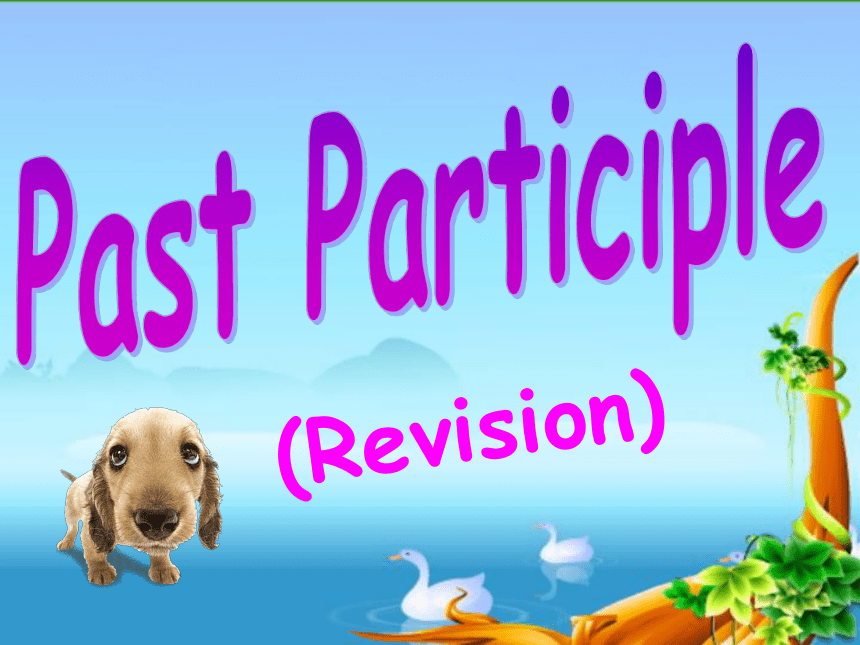 | |
| 格式 | zip | ||
| 文件大小 | 2.8MB | ||
| 资源类型 | 教案 | ||
| 版本资源 | 人教版(2019) | ||
| 科目 | 英语 | ||
| 更新时间 | 2021-04-22 11:19:57 | ||
图片预览

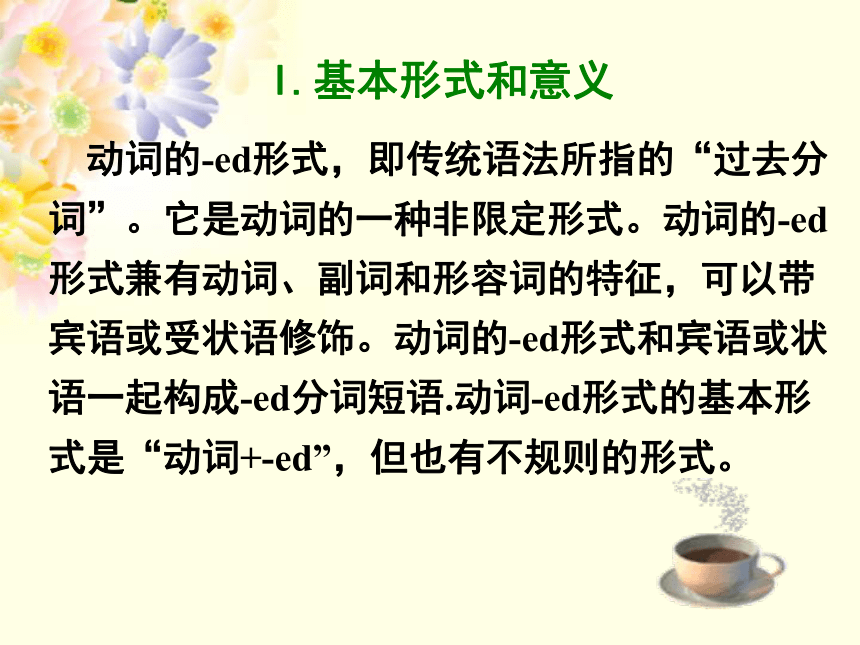
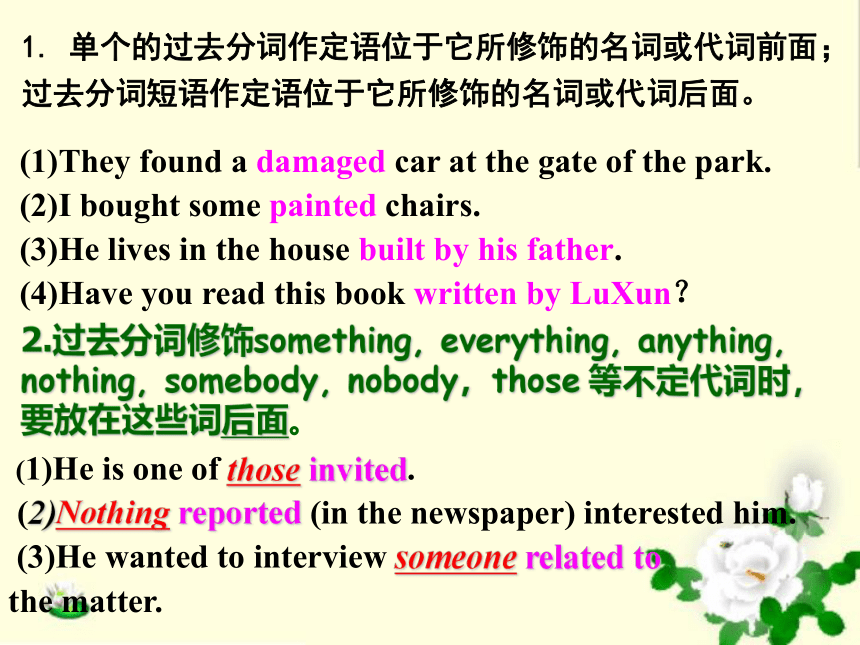
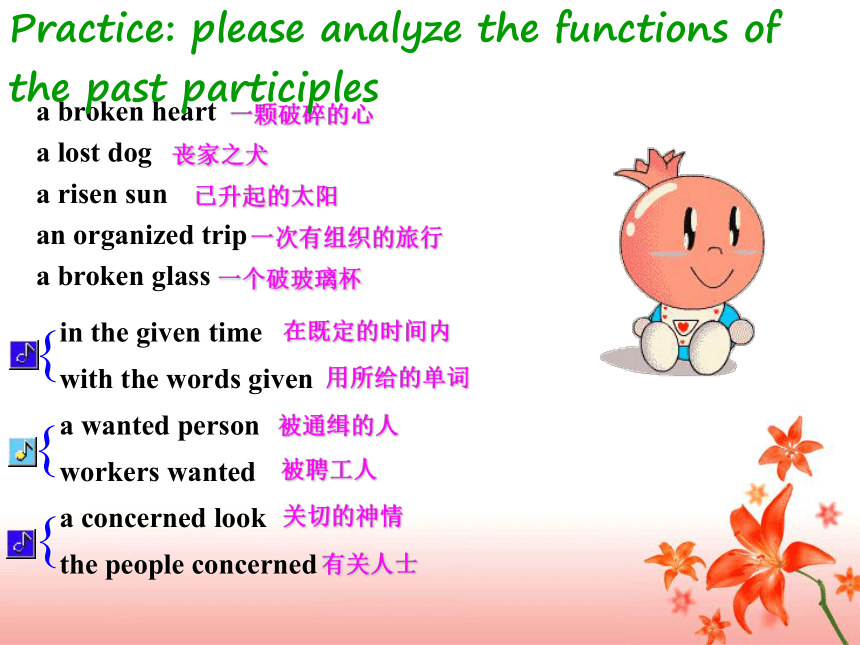
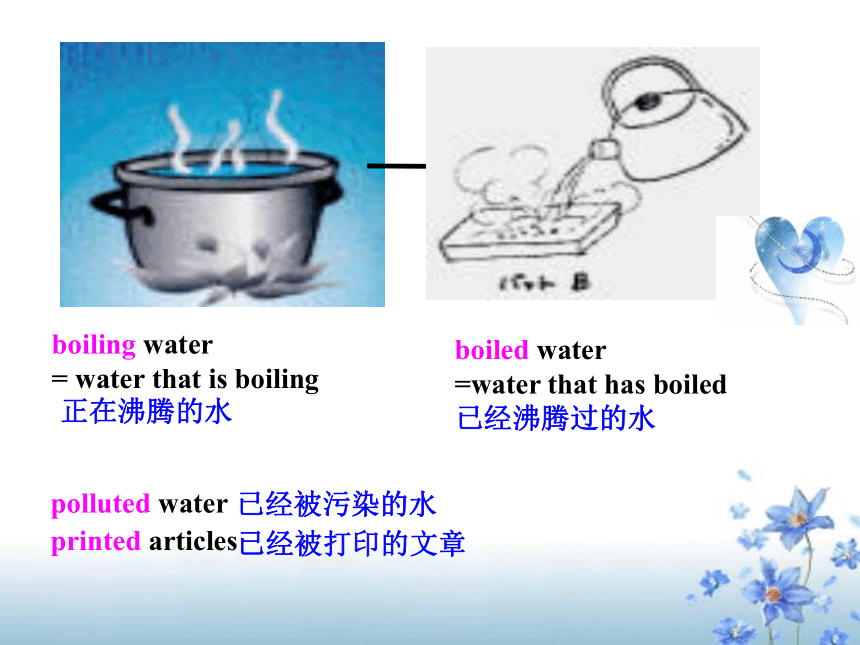
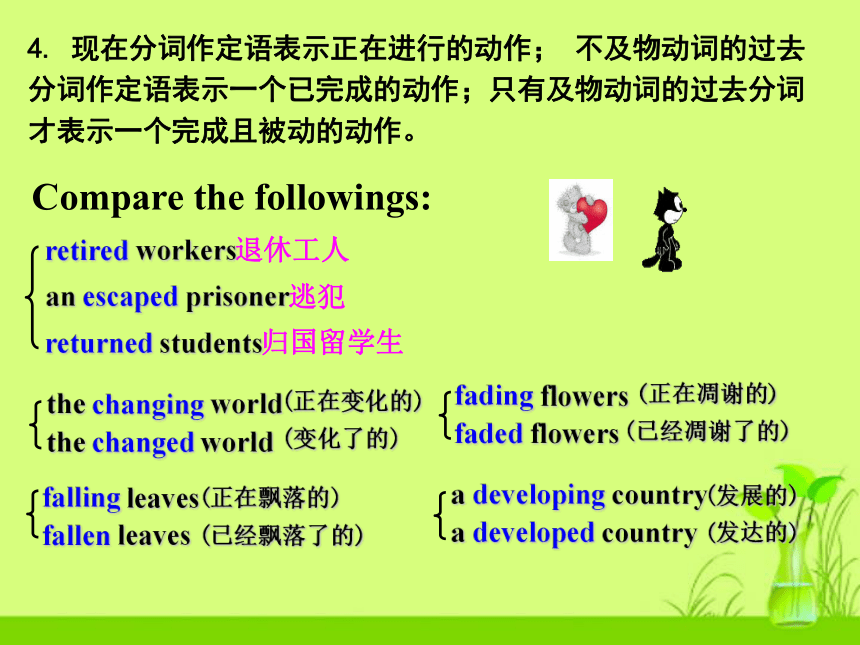
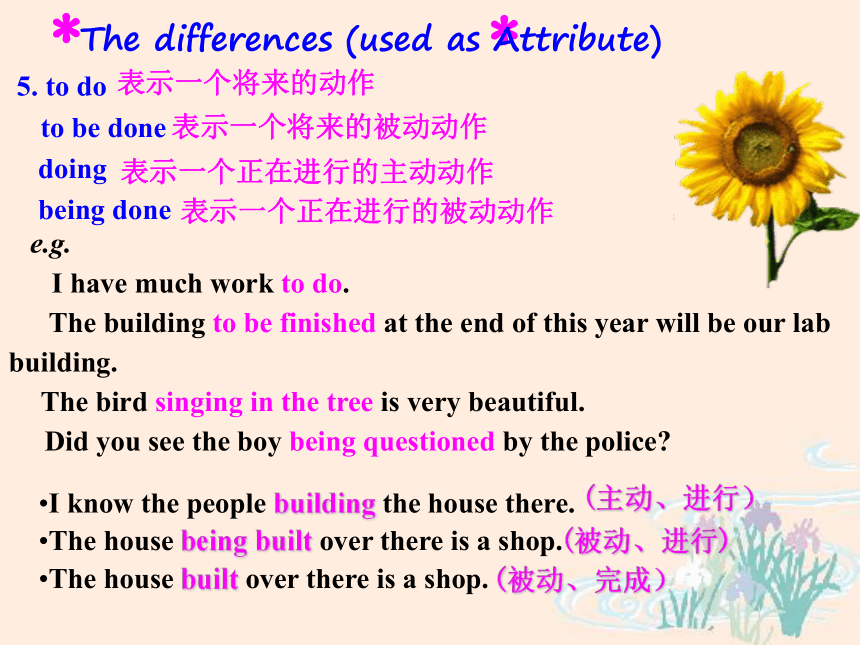

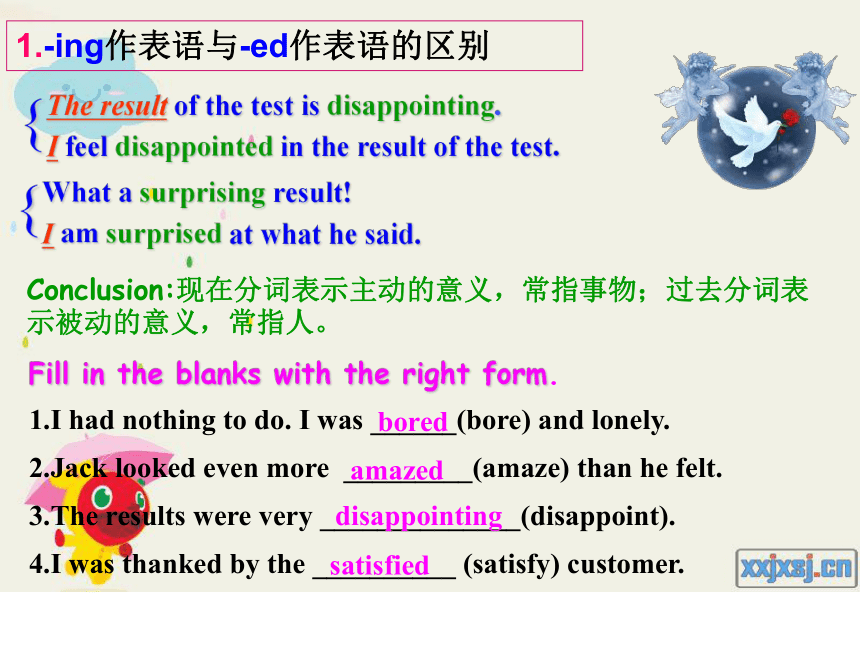
文档简介
(共27张PPT)
(Revision)
I.基本形式和意义
动词的-ed形式,即传统语法所指的“过去分词”。它是动词的一种非限定形式。动词的-ed形式兼有动词、副词和形容词的特征,可以带宾语或受状语修饰。动词的-ed形式和宾语或状语一起构成-ed分词短语.动词-ed形式的基本形式是“动词+-ed”,但也有不规则的形式。
They
found
a
damaged
car
at
the
gate
of
the
park.
(2)I
bought
some
painted
chairs.
(3)He
lives
in
the
house
built
by
his
father.
(4)Have
you
read
this
book
written
by
LuXun?
1.
单个的过去分词作定语位于它所修饰的名词或代词前面;过去分词短语作定语位于它所修饰的名词或代词后面。
(1)He
is
one
of
those
invited.
(2)Nothing
reported
(in
the
newspaper)
interested
him.
(3)He
wanted
to
interview
someone
related
to
the
matter.
2.过去分词修饰something,
everything,
anything,
nothing,
somebody,
nobody,those
等不定代词时,要放在这些词后面。
a
broken
heart
a
lost
dog
a
risen
sun
an
organized
trip
a
broken
glass
一颗破碎的心
丧家之犬
已升起的太阳
一次有组织的旅行
一个破玻璃杯
Practice:
please
analyze
the
functions
of
the
past
participles
在既定的时间内
用所给的单词
被通缉的人
被聘工人
关切的神情
有关人士
in
the
given
time
with
the
words
given
a
wanted
person
workers
wanted
a
concerned
look
the
people
concerned
{
{
{
boiling
water
=
water
that
is
boiling
boiled
water
=water
that
has
boiled
正在沸腾的水
已经沸腾过的水
polluted
water
printed
articles
已经被污染的水
已经被打印的文章
4.
现在分词作定语表示正在进行的动作;
不及物动词的过去分词作定语表示一个已完成的动作;只有及物动词的过去分词才表示一个完成且被动的动作。
退休工人
逃犯
归国留学生
Compare
the
followings:
(正在变化的)
(变化了的)
(正在凋谢的)
(已经凋谢了的)
(发展的)
(发达的)
(正在飘落的)
(已经飘落了的)
the
changing
world
the
changed
world
fading
flowers
faded
flowers
falling
leaves
fallen
leaves
a
developing
country
a
developed
country
retired
workers
an
escaped
prisoner
returned
students
e.g.
I
have
much
work
to
do.
The
building
to
be
finished
at
the
end
of
this
year
will
be
our
lab
building.
The
bird
singing
in
the
tree
is
very
beautiful.
Did
you
see
the
boy
being
questioned
by
the
police?
5.
to
do
to
be
done
doing
being
done
表示一个将来的动作
表示一个正在进行的被动动作
表示一个将来的被动动作
表示一个正在进行的主动动作
﹡
﹡
The
differences
(used
as
Attribute)
I
know
the
people
building
the
house
there.
The
house
being
built
over
there
is
a
shop.
The
house
built
over
there
is
a
shop.
(主动、进行)
(被动、进行)
(被动、完成)
Exercises
1.The
repairs
cost
a
lot
,but
it’s
money
well
.
A.
to
spend
B.
spent
C.
being
spent
D.
spending
2.The
prize
of
the
game
show
is
$30,000
and
an
all
expenses
_____
vacation
to
China.
A.
paying
B.
paid
C.
to
be
paid
D.
being
paid
3.
The
disc,
digitally
___
in
the
studio,
sounded
fantastic
at
the
party
that
night.
A.
recorded
B.
recording
C.
to
be
recorded
D.
having
recorded
4.Linda
worked
for
the
Minnesota
Manufacturing
and
Mining
company,
___as
3M.
A.
knowing
B.
known
C.
being
known
D.
to
be
known
B
B
A
B
1.-ing作表语与-ed作表语的区别
The
result
of
the
test
is
disappointing.
I
feel
disappointed
in
the
result
of
the
test.
{
What
a
surprising
result!
I
am
surprised
at
what
he
said.
{
Conclusion:现在分词表示主动的意义,常指事物;过去分词表示被动的意义,常指人。
Fill
in
the
blanks
with
the
right
form.
1.I
had
nothing
to
do.
I
was
______(bore)
and
lonely.
2.Jack
looked
even
more
_________(amaze)
than
he
felt.
3.The
results
were
very
______________(disappoint).
4.I
was
thanked
by
the
__________
(satisfy)
customer.
amazed
bored
disappointing
satisfied
The
window
is
broken.
The
window
was
broken
by
the
boy.
Conclusion:
be
+
过去分词,如果表示动作的完成和状态是系表结构,此时它相当于一个形容词;如果表示被动的动作是被动语态,此时主语为动作的承受者,后常跟by短语。
2.
过去分词作表语和被动语态的区别
Compare:
{
(1)
完全形容词化了的动词-ed形式:可以被very等副词修饰,可以有比较级等级形式。常见的有常见的有:bored,
disappointed,
excited,
frightened,
interested,
pleased,
puzzled,
satisfied,
surprised,
tired,
worried
等。
(2)有的动词-ed形式可以被副词well修饰,如:built,
cooked,
done,
dressed,
known,
prepared,
written等。
(3)其它副词也可以修饰动词-ed形式
,如:deeply
moved,
highly
developed,
heavily--populated等。
3.
注意事项
4.动词-ed形式作表语时,其后可以接介词短语、不定式短语及that
引导的宾语从句。
e.g.:
He
is
very
much
disappointed
at
the
result.
The
mother
was
pleased
to
hear
from
her
son.
I’m
satisfied
that
you
didn’t
tell
me
a
lie.
1.As
we
joined
the
big
crowd,
I
got
___from
my
friends.
A.
separated
B.
spared
C.lost
D.
missed
2.I
don’t
know
the
restaurant,but
it
is
____
to
be
quite
a
good
one.
A.
said
B.
told
C.
spoken
D.
talked
3.
The
young
man
seems
to
be
_____in
law.
A.
interesting
B.
interested
C.
interest
D.
being
interested
4.
Have
you
read
the
news
in
today's
newspaper?This
news
sounds
_____.
A.
encouraging
B.
encouraged
C.
encourage
D.
to
encourage
5.----Shall
we
go
swimming
?
----OK.
I’ll
just
go
and
get
_____.
A.
changed
B.
to
change
C.
to
be
changed
D.
changing
Exercises:
A
A
B
A
A
Step
Ⅲ
used
as
Object
Complement
及物动词的过去分词作宾补表示一个完成且被动的动作;
不及物动词的过去分词作宾补只表示动作的完成和状态。
When
he
arrived,
he
found
all
the
work
finished.
We
found
the
village
greatly
changed.
2.现在分词作宾补表示一个主动或正在进行的动作;
现
在分词的被动式作宾补表示一个正在进行的被动动作。
I
am
sorry
to
have
kept
you
waiting
.
I
saw
the
child
being
beaten
by
his
father.
The
thief
was
brought
in
with
his
hands
tied
behind
his
back.
?
With
all
the
work
finished,
he
went
back.
(1)让某人做某事/让某事(被人)做
(2)遭受某种损失或某种不愿要的结果
1.
have
sth
done
Yesterday
she
had
her
wallet
stolen.
The
old
man
had
his
leg
broken
in
the
accident.
2.介词with+宾语+过去分词
The
villagers
had
many
trees
planted
just
then.
I
have
had
my
bike
repaired.
ATTENTION
﹡
﹡
Exercises:
1.You
should
understand
the
traffic
rule
by
now.
You’ve
had
it
____
often
enough.
A.
explaining
B.
to
explain
C.
explain
D.
explained
2.Helen
had
to
shout
____
above
the
sound
of
the
music.
A.
making
herself
hear
B.
to
make
herself
hear
C.
make
herself
heard
D.
to
make
herself
heard
3.If
you
want
_____
immediately,
you
have
to
give
us
some
money
in
advance.
A.
that
the
work
be
done
B.
the
work
done
C.
to
have
done
the
job
D.
the
job
that
is
done
D
D
B
4.
A
cook
will
be
immediately
fired
if
he
is
found
_____
in
the
kitchen.
A.
smoke
B.
smoking
C.
to
smoke
D.
smoked
5.
The
managers
discussed
the
plan
that
they
would
like
to
see
______the
next
year.
A.
carry
out
B.
carrying
out
C.
carried
out
D.
to
carry
out
B
C
1.
作时间状语
Told
of
his
mother’s
accident,
Jack
phoned
the
hospital.
Translated
into
English,
the
sentence
was
found
to
have
a
different
word
order.
When
asked
to
speak,
he
complained
about
the
poor
service.
2.
作原因状语
Caught
in
the
rain,
he
had
a
fever.
Inspired
by
Oprah
Winfery,
she
became
confident.
Step
Ⅳ
used
as
Adverbial
3.
作条件状语
Given
more
time,
I’ll
be
able
to
do
it
better.
Cleared,
this
site
would
be
very
valuable.
The
house
will
look
bigger
if
painted
white.
She
will
gladly
come
to
your
house
if
invited.
4.
作让步状语
Defeated,
he
remained
a
popular
boxer.
Though
told
to
stop,
he
kept
on
walking.
Even
if
given
every
opportunity,
they
would
not
succeed.
5.
作方式状语
I
am
returning
your
letter
as
requested.
He
was
walking
sadly
as
if
injured.
6.
作伴随状语
Mary
came
out
of
the
room,
followed
by
her
dog.
A
crowd
rushed
in,
armed
with
sticks.
Seen
from
the
hill,
our
school
looks
more
beautiful.
Seeing
from
the
hill,
we
can
see
our
beautiful
school.
3.
Having
studied
hard,
he
succeeded
in
passing
the
final
exam.
4.
Having
been
told
to
stay
in
Beijing,
the
boy
decided
not
to
return
to
his
village.
Conclusion:
1.过去分词和现在分词逻辑上的主语都为句子主语,但是过去分词与主语之间存在被动关系,而现在分词与主语之间存在主动关系。
2.现在分词的完成被动式和过去分词两者都可
表示
“完成”和
“被动”,但前者更加强调
分词动作明显先于谓语动作;而后者的时间性不强。
7.动词的
–ed形式与-ing
形式作状语的区别:
doing
having
done
done
having
been
done
与句中主语构成逻辑上的主谓关系,与句中谓语动作同时发生
与句中主语构成逻辑上的主谓关系,先于谓语动作发生
与句中主语构成逻辑上的动宾关系
与句中主语构成逻辑上的动宾关系,且先于谓语动作发生
The
differences
(used
as
Adverbial)
﹡
﹡
Exercises:
1.____
into
use
in
April
2000,
the
hotline
was
meant
for
residents
reporting
water
and
heating
supply
breakdowns.
A.
Put
B.
Putting
C.
Having
put
D.
Being
put
2.____
in
a
white
uniform,
he
looks
more
like
a
cook
than
a
doctor.
A.
Dressed
B.
To
dress
C.
Dressing
D.
Having
dressed
3.____
in
the
mountains
for
a
week,
the
two
students
were
finally
saved
by
the
local
police.
A.
Having
lost
B.
Lost
C.
Being
lost
D.
Losing
4.When_____help,
one
often
says
“Thank
you.”
or
“It’s
kind
of
you.”
A.
offering
B.
to
offer
C.
to
be
offered
D.
offered
5.When
first
______
to
the
market,
these
products
enjoyed
great
success.
A.
introducing
B.
introduced
C.
introduce
D.
being
introduced
6.___
with
the
size
of
the
whole
earth,
the
biggest
ocean
does
not
seem
big
at
all.
A.
Compare
B.
When
compare
C.
Comparing
D.
When
compared
7.
______
by
the
beauty
of
nature,
the
girl
from
London
decide
to
spend
another
two
days
on
the
farm.
A.
Attracting
B
.
Having
attracted
C.
To
be
attracted
D.
Attracted
8.
They
are
going
to
have
the
service
man
___
an
electric
fan
in
the
office
tomorrow.
A.
fix
B.
to
fix
C.
to
be
fixed
D.
fixed
9.
You
will
see
this
product
____
wherever
you
go.
A.
to
be
advertised
B.
advertised
C.
advertise
D.
advertising
10.____the
programme,
they
have
to
stay
there
for
another
two
weeks.
A.
Not
completing
B.
Not
completed
C.
Not
having
completed
D.
Having
not
completed
11.Our
self-respect
increased
when
_____by
others.
A.
feeling
accepted
B.
accepted
C.
we
feel
accepted
D.
accepting
Finish
all
the
exercises
Homework
(Revision)
I.基本形式和意义
动词的-ed形式,即传统语法所指的“过去分词”。它是动词的一种非限定形式。动词的-ed形式兼有动词、副词和形容词的特征,可以带宾语或受状语修饰。动词的-ed形式和宾语或状语一起构成-ed分词短语.动词-ed形式的基本形式是“动词+-ed”,但也有不规则的形式。
They
found
a
damaged
car
at
the
gate
of
the
park.
(2)I
bought
some
painted
chairs.
(3)He
lives
in
the
house
built
by
his
father.
(4)Have
you
read
this
book
written
by
LuXun?
1.
单个的过去分词作定语位于它所修饰的名词或代词前面;过去分词短语作定语位于它所修饰的名词或代词后面。
(1)He
is
one
of
those
invited.
(2)Nothing
reported
(in
the
newspaper)
interested
him.
(3)He
wanted
to
interview
someone
related
to
the
matter.
2.过去分词修饰something,
everything,
anything,
nothing,
somebody,
nobody,those
等不定代词时,要放在这些词后面。
a
broken
heart
a
lost
dog
a
risen
sun
an
organized
trip
a
broken
glass
一颗破碎的心
丧家之犬
已升起的太阳
一次有组织的旅行
一个破玻璃杯
Practice:
please
analyze
the
functions
of
the
past
participles
在既定的时间内
用所给的单词
被通缉的人
被聘工人
关切的神情
有关人士
in
the
given
time
with
the
words
given
a
wanted
person
workers
wanted
a
concerned
look
the
people
concerned
{
{
{
boiling
water
=
water
that
is
boiling
boiled
water
=water
that
has
boiled
正在沸腾的水
已经沸腾过的水
polluted
water
printed
articles
已经被污染的水
已经被打印的文章
4.
现在分词作定语表示正在进行的动作;
不及物动词的过去分词作定语表示一个已完成的动作;只有及物动词的过去分词才表示一个完成且被动的动作。
退休工人
逃犯
归国留学生
Compare
the
followings:
(正在变化的)
(变化了的)
(正在凋谢的)
(已经凋谢了的)
(发展的)
(发达的)
(正在飘落的)
(已经飘落了的)
the
changing
world
the
changed
world
fading
flowers
faded
flowers
falling
leaves
fallen
leaves
a
developing
country
a
developed
country
retired
workers
an
escaped
prisoner
returned
students
e.g.
I
have
much
work
to
do.
The
building
to
be
finished
at
the
end
of
this
year
will
be
our
lab
building.
The
bird
singing
in
the
tree
is
very
beautiful.
Did
you
see
the
boy
being
questioned
by
the
police?
5.
to
do
to
be
done
doing
being
done
表示一个将来的动作
表示一个正在进行的被动动作
表示一个将来的被动动作
表示一个正在进行的主动动作
﹡
﹡
The
differences
(used
as
Attribute)
I
know
the
people
building
the
house
there.
The
house
being
built
over
there
is
a
shop.
The
house
built
over
there
is
a
shop.
(主动、进行)
(被动、进行)
(被动、完成)
Exercises
1.The
repairs
cost
a
lot
,but
it’s
money
well
.
A.
to
spend
B.
spent
C.
being
spent
D.
spending
2.The
prize
of
the
game
show
is
$30,000
and
an
all
expenses
_____
vacation
to
China.
A.
paying
B.
paid
C.
to
be
paid
D.
being
paid
3.
The
disc,
digitally
___
in
the
studio,
sounded
fantastic
at
the
party
that
night.
A.
recorded
B.
recording
C.
to
be
recorded
D.
having
recorded
4.Linda
worked
for
the
Minnesota
Manufacturing
and
Mining
company,
___as
3M.
A.
knowing
B.
known
C.
being
known
D.
to
be
known
B
B
A
B
1.-ing作表语与-ed作表语的区别
The
result
of
the
test
is
disappointing.
I
feel
disappointed
in
the
result
of
the
test.
{
What
a
surprising
result!
I
am
surprised
at
what
he
said.
{
Conclusion:现在分词表示主动的意义,常指事物;过去分词表示被动的意义,常指人。
Fill
in
the
blanks
with
the
right
form.
1.I
had
nothing
to
do.
I
was
______(bore)
and
lonely.
2.Jack
looked
even
more
_________(amaze)
than
he
felt.
3.The
results
were
very
______________(disappoint).
4.I
was
thanked
by
the
__________
(satisfy)
customer.
amazed
bored
disappointing
satisfied
The
window
is
broken.
The
window
was
broken
by
the
boy.
Conclusion:
be
+
过去分词,如果表示动作的完成和状态是系表结构,此时它相当于一个形容词;如果表示被动的动作是被动语态,此时主语为动作的承受者,后常跟by短语。
2.
过去分词作表语和被动语态的区别
Compare:
{
(1)
完全形容词化了的动词-ed形式:可以被very等副词修饰,可以有比较级等级形式。常见的有常见的有:bored,
disappointed,
excited,
frightened,
interested,
pleased,
puzzled,
satisfied,
surprised,
tired,
worried
等。
(2)有的动词-ed形式可以被副词well修饰,如:built,
cooked,
done,
dressed,
known,
prepared,
written等。
(3)其它副词也可以修饰动词-ed形式
,如:deeply
moved,
highly
developed,
heavily--populated等。
3.
注意事项
4.动词-ed形式作表语时,其后可以接介词短语、不定式短语及that
引导的宾语从句。
e.g.:
He
is
very
much
disappointed
at
the
result.
The
mother
was
pleased
to
hear
from
her
son.
I’m
satisfied
that
you
didn’t
tell
me
a
lie.
1.As
we
joined
the
big
crowd,
I
got
___from
my
friends.
A.
separated
B.
spared
C.lost
D.
missed
2.I
don’t
know
the
restaurant,but
it
is
____
to
be
quite
a
good
one.
A.
said
B.
told
C.
spoken
D.
talked
3.
The
young
man
seems
to
be
_____in
law.
A.
interesting
B.
interested
C.
interest
D.
being
interested
4.
Have
you
read
the
news
in
today's
newspaper?This
news
sounds
_____.
A.
encouraging
B.
encouraged
C.
encourage
D.
to
encourage
5.----Shall
we
go
swimming
?
----OK.
I’ll
just
go
and
get
_____.
A.
changed
B.
to
change
C.
to
be
changed
D.
changing
Exercises:
A
A
B
A
A
Step
Ⅲ
used
as
Object
Complement
及物动词的过去分词作宾补表示一个完成且被动的动作;
不及物动词的过去分词作宾补只表示动作的完成和状态。
When
he
arrived,
he
found
all
the
work
finished.
We
found
the
village
greatly
changed.
2.现在分词作宾补表示一个主动或正在进行的动作;
现
在分词的被动式作宾补表示一个正在进行的被动动作。
I
am
sorry
to
have
kept
you
waiting
.
I
saw
the
child
being
beaten
by
his
father.
The
thief
was
brought
in
with
his
hands
tied
behind
his
back.
?
With
all
the
work
finished,
he
went
back.
(1)让某人做某事/让某事(被人)做
(2)遭受某种损失或某种不愿要的结果
1.
have
sth
done
Yesterday
she
had
her
wallet
stolen.
The
old
man
had
his
leg
broken
in
the
accident.
2.介词with+宾语+过去分词
The
villagers
had
many
trees
planted
just
then.
I
have
had
my
bike
repaired.
ATTENTION
﹡
﹡
Exercises:
1.You
should
understand
the
traffic
rule
by
now.
You’ve
had
it
____
often
enough.
A.
explaining
B.
to
explain
C.
explain
D.
explained
2.Helen
had
to
shout
____
above
the
sound
of
the
music.
A.
making
herself
hear
B.
to
make
herself
hear
C.
make
herself
heard
D.
to
make
herself
heard
3.If
you
want
_____
immediately,
you
have
to
give
us
some
money
in
advance.
A.
that
the
work
be
done
B.
the
work
done
C.
to
have
done
the
job
D.
the
job
that
is
done
D
D
B
4.
A
cook
will
be
immediately
fired
if
he
is
found
_____
in
the
kitchen.
A.
smoke
B.
smoking
C.
to
smoke
D.
smoked
5.
The
managers
discussed
the
plan
that
they
would
like
to
see
______the
next
year.
A.
carry
out
B.
carrying
out
C.
carried
out
D.
to
carry
out
B
C
1.
作时间状语
Told
of
his
mother’s
accident,
Jack
phoned
the
hospital.
Translated
into
English,
the
sentence
was
found
to
have
a
different
word
order.
When
asked
to
speak,
he
complained
about
the
poor
service.
2.
作原因状语
Caught
in
the
rain,
he
had
a
fever.
Inspired
by
Oprah
Winfery,
she
became
confident.
Step
Ⅳ
used
as
Adverbial
3.
作条件状语
Given
more
time,
I’ll
be
able
to
do
it
better.
Cleared,
this
site
would
be
very
valuable.
The
house
will
look
bigger
if
painted
white.
She
will
gladly
come
to
your
house
if
invited.
4.
作让步状语
Defeated,
he
remained
a
popular
boxer.
Though
told
to
stop,
he
kept
on
walking.
Even
if
given
every
opportunity,
they
would
not
succeed.
5.
作方式状语
I
am
returning
your
letter
as
requested.
He
was
walking
sadly
as
if
injured.
6.
作伴随状语
Mary
came
out
of
the
room,
followed
by
her
dog.
A
crowd
rushed
in,
armed
with
sticks.
Seen
from
the
hill,
our
school
looks
more
beautiful.
Seeing
from
the
hill,
we
can
see
our
beautiful
school.
3.
Having
studied
hard,
he
succeeded
in
passing
the
final
exam.
4.
Having
been
told
to
stay
in
Beijing,
the
boy
decided
not
to
return
to
his
village.
Conclusion:
1.过去分词和现在分词逻辑上的主语都为句子主语,但是过去分词与主语之间存在被动关系,而现在分词与主语之间存在主动关系。
2.现在分词的完成被动式和过去分词两者都可
表示
“完成”和
“被动”,但前者更加强调
分词动作明显先于谓语动作;而后者的时间性不强。
7.动词的
–ed形式与-ing
形式作状语的区别:
doing
having
done
done
having
been
done
与句中主语构成逻辑上的主谓关系,与句中谓语动作同时发生
与句中主语构成逻辑上的主谓关系,先于谓语动作发生
与句中主语构成逻辑上的动宾关系
与句中主语构成逻辑上的动宾关系,且先于谓语动作发生
The
differences
(used
as
Adverbial)
﹡
﹡
Exercises:
1.____
into
use
in
April
2000,
the
hotline
was
meant
for
residents
reporting
water
and
heating
supply
breakdowns.
A.
Put
B.
Putting
C.
Having
put
D.
Being
put
2.____
in
a
white
uniform,
he
looks
more
like
a
cook
than
a
doctor.
A.
Dressed
B.
To
dress
C.
Dressing
D.
Having
dressed
3.____
in
the
mountains
for
a
week,
the
two
students
were
finally
saved
by
the
local
police.
A.
Having
lost
B.
Lost
C.
Being
lost
D.
Losing
4.When_____help,
one
often
says
“Thank
you.”
or
“It’s
kind
of
you.”
A.
offering
B.
to
offer
C.
to
be
offered
D.
offered
5.When
first
______
to
the
market,
these
products
enjoyed
great
success.
A.
introducing
B.
introduced
C.
introduce
D.
being
introduced
6.___
with
the
size
of
the
whole
earth,
the
biggest
ocean
does
not
seem
big
at
all.
A.
Compare
B.
When
compare
C.
Comparing
D.
When
compared
7.
______
by
the
beauty
of
nature,
the
girl
from
London
decide
to
spend
another
two
days
on
the
farm.
A.
Attracting
B
.
Having
attracted
C.
To
be
attracted
D.
Attracted
8.
They
are
going
to
have
the
service
man
___
an
electric
fan
in
the
office
tomorrow.
A.
fix
B.
to
fix
C.
to
be
fixed
D.
fixed
9.
You
will
see
this
product
____
wherever
you
go.
A.
to
be
advertised
B.
advertised
C.
advertise
D.
advertising
10.____the
programme,
they
have
to
stay
there
for
another
two
weeks.
A.
Not
completing
B.
Not
completed
C.
Not
having
completed
D.
Having
not
completed
11.Our
self-respect
increased
when
_____by
others.
A.
feeling
accepted
B.
accepted
C.
we
feel
accepted
D.
accepting
Finish
all
the
exercises
Homework
